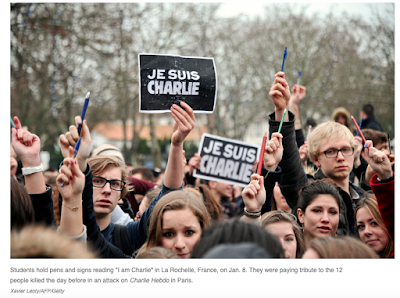 On January 7th 2015, French satirical newspaper Charlie Hebdo was attacked by two gunmen, subsequently killing eight journalists and sparking a massive free speech debate around the world. The newspaper was often under criticism for its controversial depictions of religious figures, primarily of the prophet Muhammad, which seems to be the cause for the terrorist attack. However, the newspaper claimed satire as its main defense, which begs two questions: what is the purpose of satire, and how far is "too far?"
On January 7th 2015, French satirical newspaper Charlie Hebdo was attacked by two gunmen, subsequently killing eight journalists and sparking a massive free speech debate around the world. The newspaper was often under criticism for its controversial depictions of religious figures, primarily of the prophet Muhammad, which seems to be the cause for the terrorist attack. However, the newspaper claimed satire as its main defense, which begs two questions: what is the purpose of satire, and how far is "too far?" According to this definition, which can be found in more depth here, the purpose of satire is to "provide constructive criticism of certain individuals and entities. It may also help expose certain characteristics of an entity or individual to help establish awareness of these characteristics throughout society. Ideally, satire will help society communicate about social issues. Comic relief is normally a secondary purpose of satire" We talked at length in our class discussion about the purpose of satire, what the ultimate goal of this form of speech/comedy is, and I think that a lot of us would agree that the aforementioned definition is the same conclusion that we came to. One of our classmates mentioned that the idea of satire is to "punch up," essentially: those in a position of power use satire to make a comical criticism of those in power above them, not below them. The purpose, in my opinion, is not to "punch down" so to speak, because then you are using your privilege to attack somebody else (or often a group of people) who may not have the same power to fight back. It causes an unequal power balance and takes away the purpose of satire in the first place. What was the purpose of Charlie Hebdo depicting religious figures crudely, some may ask? Personally, I'm unsure. I would assume that it was to critique organized religion, which isn't (going by the previous definition) satire, that's just taking a low blow at the sake of others.
After the attack on Charlie Hebdo, carried out by Islamic extremists, France saw a rise in hate speech against its muslim citizens. In this article about the hate speech issue, the author writes "But for France's nearly 6 million Muslims, Charlie Hebdo being allowed to insult Islam while others are jailed for racist remarks seems hypocritical." She then quotes "Myriam Doudech, 36, says she condemns the attack on the journalists who drew caricatures of the prophet Mohammed. But as a Muslim, she sees a double standard when it comes to free speech. 'You know, in France you cannot attack some religions, but they laugh about Islam,' she says. 'We all need respect. But the rules have to be the same for everybody.'"
Obviously, no matter what the Charlie Hebdo was publishing, the terrorist attack should never have happened. It was a senseless tragedy that affected innumerable amounts of people. But my questions to you all are this: where do we draw the line in terms of satire? Where and when do we say "that was too far?" Should satire be regulated at all?
I remember when we first discussed this in class, when I had never heard about this before. It really shocked me with the depth of the arguments for and against the Charlie Hebdo magazine, and it also shocked me how I was finding truth in both sides of the free speech argument. People should be allowed to say what they please; however, hate speech and hurtful speech should not be supported, in my opinion. I do think that, to some extent, satire should be regulated. Based on the definition you provided, I think one of the main things about the definition is that satire doesn't necessarily mean that the product is offensive. I believe that if the satire in question is blatantly offensive and "punching up," as you mentioned, it should not be allowed in order to prevent tragedies such as this from happening.
ReplyDeleteI would argue against the need to restrict satire in published works such as newspapers or comics. People often use satire for the second purpose listed "comic relief" and usually on social or communal issues. However, when the comic ends up being something that a person disagrees with or does not like, then it becomes offensive. However, everything is fair game when it comes to creating "funny" things on issues.
ReplyDeleteI don't think satire should be regulated because it's not up to the government to decide what's funny. A lot of times, satire targets the government so having it regulated would probably increase the numbers of "punching down" like you said, since they would become an easier target, or celebrities, who already get made fun of enough for the dumbest things. Politicians make real mistakes, their potential for satire and its importance are much higher than any other group of people. For Charlie, making satirical statements about political figures is what got him killed. I'm assuming though, that this only spread his ideas and made people support his work even more. It did not benefit the people he satirized. Without satire, people couldn't laugh at what's going on in the world, they would just have to take it seriously all the time which becomes stressful. Satire gets people to think in new ways, which the government cannot and should not control.
ReplyDelete